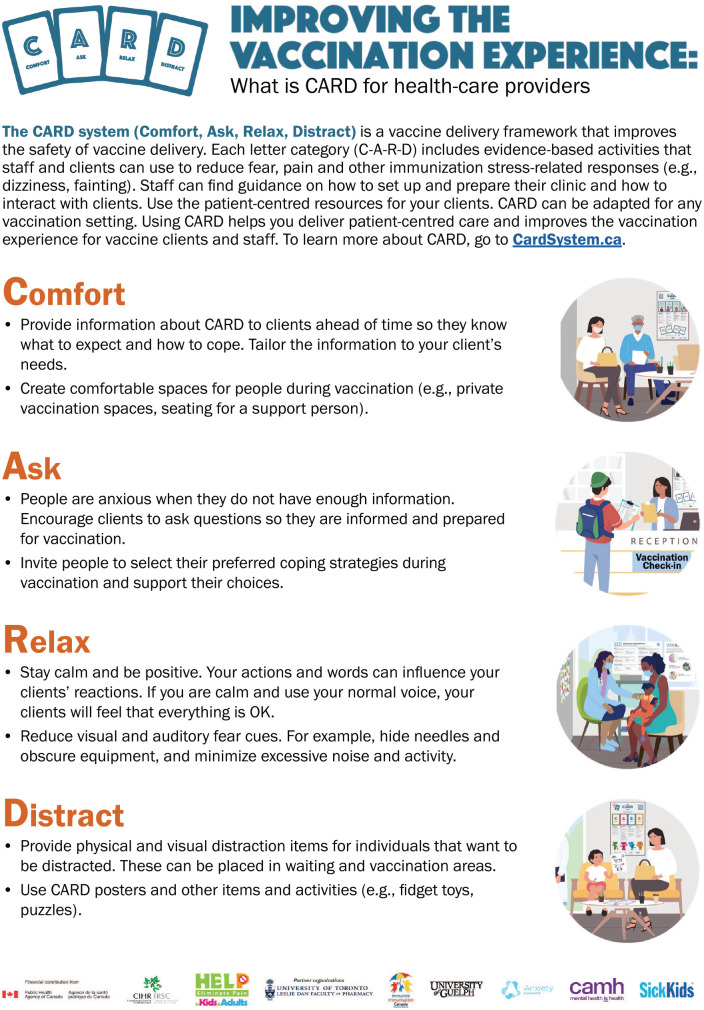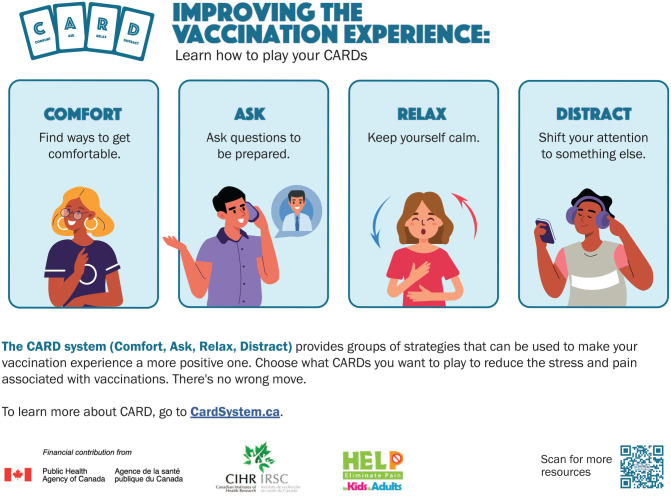Community pharmacy-based vaccinations are a feasible and efficient way of immunizing large numbers of individuals. Across Canada, the last decade has seen an increasing number of vaccines being administered via community pharmacies. During the COVID-19 pandemic alone, pharmacists have been responsible for the administration of more than 17 million COVID-19 vaccine doses. 1
The increase in the number of vaccines being administered by pharmacy immunizers means that they will be more likely to encounter adverse reactions associated with vaccine administration, the most frequent being immunization stress-related response (ISRR). 2 ISRR includes symptoms such as fear, pain, dizziness and fainting and is more prevalent in children and young adults undergoing vaccination. 3 Preinjection anxiety and fear can fuel ISRR, and these vaccine-associated harms can contribute to negative attitudes about vaccines and health care providers administering them and can lead to refusal of subsequent vaccination. 2 Importantly, witnessing ISRR can also negatively affect health care providers who administer vaccines as well as onlookers, such as caregivers or siblings. Efforts to prevent the iatrogenic harms of vaccination are relevant and important across vaccination settings and in community pharmacies in particular, due to the increasing demand for vaccination services in this setting and likelihood that ISRR will be more frequently encountered.
In 2019, the World Health Organization (WHO) named vaccine hesitancy—a delay or refusal of available vaccines—as 1 of the 10 top threats to global health. 4 The COVID-19 pandemic provided evidence for the importance of this barrier to vaccination, with significant numbers of individuals refusing COVID-19 vaccination for themselves and/or their children. Although the reasons for vaccine hesitancy are complex and multifactorial, evidence-based interventions exist to address ISRR. These interventions are summarized in our 2015 Clinical Practice Guideline (CPG) on this topic. 5 In its first position statement on mitigating pain during vaccination, based on the CPG, WHO stated that mitigating pain is part of good immunization practice; that is, pain mitigation is part of the delivery of vaccinations. 6 In subsequent work, we developed a practice tool called the CARD (Comfort Ask Relax Distract) system to help operationalize the CPG recommendations for vaccination programs. 7 CARD organizes the CPG recommendations into a user-friendly and intuitive approach. Each letter category of the word CARD incorporates evidence-based interventions from the CPG. CARD can be used as a vaccine delivery framework and communication tool to assist health care providers (Figure 1) and vaccine clients (Figure 2) with adoption of the CPG recommendations and making vaccinations more person-centred. Everyone involved in vaccinations can select interventions that are included in the letter categories to improve the vaccination experience for all. We demonstrated diminished ISRR when CARD was used (vs standard care) in 2 separate trials involving children undergoing vaccinations at school.8,9 During the COVID-19 pandemic, we additionally showed a benefit when CARD was used in mass vaccination clinics in a before-and-after study including individuals aged 12 years and older undergoing COVID-19 vaccinations. 10 A gap in research, however, exists regarding perceptions and impact of CARD for the community pharmacy vaccination context.
At present, there are no evidence-based frameworks for vaccination delivery that are systematically integrated across community pharmacies to reduce ISRR and improve the vaccination experiences of all individuals involved. In 2021, with funding from the Public Health Agency of Canada to support COVID-19 vaccination, we undertook additional research to address this knowledge to care gap. Specifically, we undertook a Knowledge Translation (KT) project aimed at adapting and evaluating CARD for the community pharmacy context. Our goal was to improve the vaccination experiences of vaccine recipients, their families and the pharmacy staff providing vaccination services. Selected creators of the CARD system partnered with various organizations, including pharmacy organizations, to undertake this work.
The project was guided by 2 frameworks: the Knowledge to Action (KTA) 11 cycle and the Consolidated Framework for Implementation Research (CFIR). 12 This supplement to the Canadian Pharmacists Journal includes 6 articles summarizing this work (Table 1). In brief, the first article explores community pharmacists’ experiences with COVID-19 vaccinations and offers suggestions to improve current practices. 13 The second article summarizes the feedback that the same pharmacist vaccinators provided about the utility of CARD and ways to incorporate it into pharmacy practice. 14 The third and fourth articles describe the clinical and implementation outcomes of a small-scale implementation project with CARD involving 5 community pharmacies.15,16 The fifth article examines perceptions of pharmacy technician students regarding a new CARD training e-module included as part of vaccine injection training education. 17 The sixth article provides guidance for pharmacies and pharmacy organizations that want to implement CARD. 18 Together, this supplement offers readers the scientific evidence base supporting CARD for community pharmacy-based vaccinations and the tools they can use to facilitate integration of this research evidence in their own practice settings.
Table 1.
Summary of articles included in this supplement *
| Description | Summary of article contents |
|---|---|
| Qualitative study including community pharmacist vaccinators from across Canada13,14 | Experiences with COVID-19 vaccinations Perceptions of CARD for use in community pharmacy-based vaccinations |
| Before-and-after CARD implementation study in community pharmacies delivering COVID-19 vaccinations in children 5-11 years old in southern Ontario15,16 | Clinical outcomes (immunization stress-related responses, satisfaction), including
children and parents/guardians Implementation outcomes (knowledge, beliefs, attitudes and practices), including vaccinators and implementation leads |
| Qualitative study including pharmacy technician students training to be vaccinators in a community college in Toronto 17 | Perceptions of CARD e-module for learning about CARD |
| Overview article describing how to implement CARD in community pharmacies 18 | Guide for CARD implementation in community pharmacy setting with summary of key considerations, tools and resources |
CARD, Comfort Ask Relax Distract.
For articles that report on the results of primary studies, the design, population and setting are summarized here.
ISRRs are iatrogenic harms of vaccination. Experiencing an ISRR can lead to negative attitudes about vaccination and future vaccine delay or refusal. 2 Mitigating ISRR is an important aspect of vaccine delivery. Not only does mitigating ISRR improve vaccine safety by reducing adverse reactions to vaccination, but it also optimizes the experiences of all individuals involved, which in turn promotes positive attitudes about vaccination and increases vaccine acceptance. Increasing vaccine acceptance can lead to positive effects on individual and societal health by reducing morbidity and mortality associated with vaccine-preventable diseases.
Footnotes
Funding: Support for this project was received from the Public Health Agency of Canada Immunization Partnership Fund (1921-HQ-000220) and a Canadian Institutes of Health Research Foundation Grant (FRN 159905) awarded to A. Taddio. The funding agencies had no input into the study. A. Taddio declares Section 9 Trademark No. 924835 for CARD held by the University of Toronto.
ORCID iD: Anna Taddio  https://orcid.org/0000-0003-4432-8975
https://orcid.org/0000-0003-4432-8975
References
- 1. Neighbourhood Pharmacy Gazette. Community pharmacy & COVID vaccinations. 2022. Available: https://neighbourhoodpharmacies.ca/sites/default/files/2022-03/NPG-Spring2022-Issue-8.pdf (accessed June 17, 2022).
- 2. McMurtry CM, Pillai Riddell R, Taddio A, et al. HELPinKids&Adults Team. Far from “just a poke”: common painful needle procedures and the development of needle fear. Clin J Pain 2015;31:S2-11. [DOI] [PMC free article] [PubMed] [Google Scholar]
- 3. Centers for Disease Control and Prevention (CDC). Syncope after vaccination—United States, January 2005-July 2007. MMWR Morb Mortal Wkly Rep 2008;57:457-60. [PubMed] [Google Scholar]
- 4. World Health Organization. Ten threats to global health in 2019. Available: https://www.who.int/news-room/spotlight/ten-threats-to-global-health-in-2019 (accessed Sept. 27, 2022).
- 5. Taddio A, McMurtry CM, Shah V, et al. HELPinKids&Adults. Reducing pain during vaccine injections: clinical practice guideline. CMAJ 2015;187: 975-82. [DOI] [PMC free article] [PubMed] [Google Scholar]
- 6. World Health Organization. Reducing pain at the time of vaccination: WHO position paper—September 2015. Wkly Epidemiol Rec 2015;90:505-16. [PubMed] [Google Scholar]
- 7. Taddio A, McMurtry CM, Bucci LM, et al. Pain Pain Go Away Team. Overview of a Knowledge Translation (KT) project to improve the vaccination experience at school: the CARD™ system. Paediatr Child Health 2019;24(Suppl 1):S3-18. [DOI] [PMC free article] [PubMed] [Google Scholar]
- 8. Freedman T, Taddio A, Alderman L, et al. Pain Pain Go Away Team. The CARD™ system for improving the vaccination experience at school: results of a small-scale implementation project on student symptoms. Paediatr Child Health 2019;24(Suppl 1):S42-53. [DOI] [PMC free article] [PubMed] [Google Scholar]
- 9. Taddio A, Gudzak V, Jantzi M, et al. Impact of the CARD (Comfort Ask Relax Distract) system on school-based vaccinations: a cluster randomized trial. Vaccine 2022;40:2802-9. [DOI] [PubMed] [Google Scholar]
- 10. Tetui M, Grindrod K, Waite N, et al. Integrating the CARD (Comfort Ask Relax Distract) system in a mass vaccination clinic to improve the experience of individuals during COVID-19 vaccination: a pre-post implementation study. Human Vacc Immunother 2022;18:2089500. [DOI] [PMC free article] [PubMed] [Google Scholar]
- 11. Graham ID, Logan J, Harrison MB, et al. Lost in knowledge translation: time for a map? J Contin Educ Health Prof 2006;26:13-24. [DOI] [PubMed] [Google Scholar]
- 12. Damschroder LJ, Aron DC, Keith RE, et al. Fostering implementation of health services research findings into practice: a consolidated framework for advancing implementation science. Implement Sci 2009;4:50. [DOI] [PMC free article] [PubMed] [Google Scholar]
- 13. Gerges S, Gudzak V, Bowles S, et al. Experiences of community pharmacists administering COVID-19 vaccinations: a qualitative study. Can Pharm J (Ott) 2023;156(Suppl):7S-17S. [DOI] [PMC free article] [PubMed] [Google Scholar]
- 14. Gudzak V, Freedman T, Logeman C, et al. Community pharmacists’ perceptions of the CARD (Comfort Ask Relax Distract) system for use during vaccinations. Can Pharm J (Ott) 2023;156(Suppl):18S-26S. [DOI] [PMC free article] [PubMed] [Google Scholar]
- 15. Taddio A, Morrison J, Gudzak V, et al. CARD (Comfort Ask Relax Distract) for community pharmacy vaccinations in children: effect on stress-related responses and satisfaction. Can Pharm J (Ott) 2023;156(Suppl):27S-35S. [DOI] [PMC free article] [PubMed] [Google Scholar]
- 16. Taddio A, Morrison J, Gudzak V, et al. Integration of CARD (Comfort Ask Relax Distract) for COVID-19 community pharmacy vaccination in children: effect on implementation outcomes. Can Pharm J (Ott) 2023;156(Suppl):36S-47S. [DOI] [PMC free article] [PubMed] [Google Scholar]
- 17. Taddio A, Gerges S, Rocchi M, et al. Perceptions of pharmacy technician students of the CARD (Comfort Ask Relax Distract) e-module introduced as part of vaccine injection training. Can Pharm J (Ott) 2023;156(Suppl): 48S-55S. [DOI] [PMC free article] [PubMed] [Google Scholar]
- 18. Taddio A, Rocchi M, Bucci LM, et al. CARD (Comfort Ask Relax Distract) implementation guide for community pharmacies administering vaccinations: how to play your best hand.. Can Pharm J (Ott) 2023;156(Suppl):56S-61S. [DOI] [PMC free article] [PubMed] [Google Scholar]




